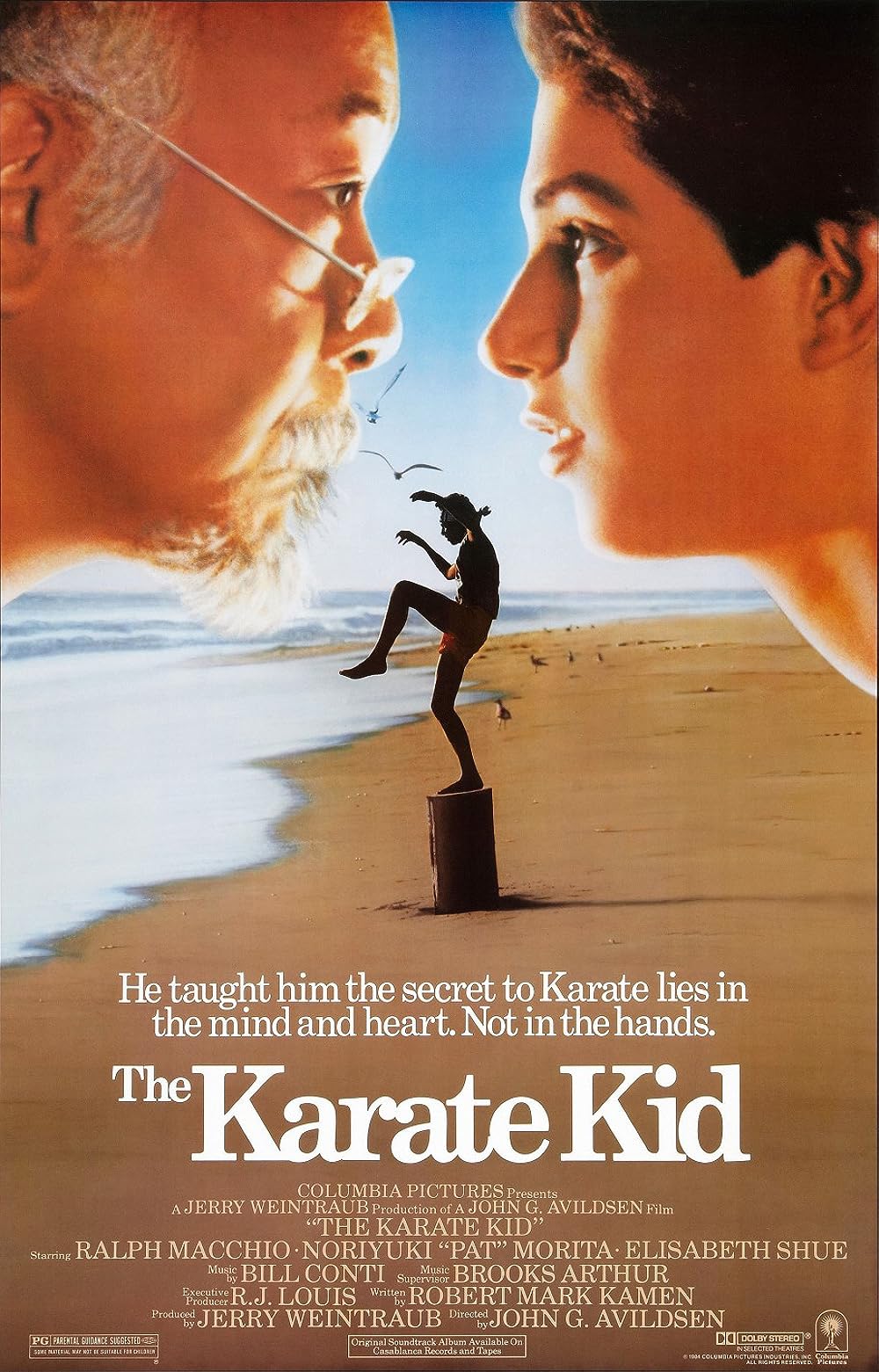“The Karate Kid” (1984): A Timeless Tale of Perseverance and Mentorship – Film Review

Introduction to an Iconic Classic
“The Karate Kid,” directed by John G. Avildsen and released in 1984, is a film that has transcended generations to become a beloved classic. It tells the story of Daniel LaRusso, a teenager who moves to California and learns karate from an unlikely mentor, Mr. Miyagi, to defend himself against bullies. At its heart, “The Karate Kid” is a story about perseverance, mentorship, and the journey of self-discovery. The film’s enduring appeal lies in its compelling narrative, memorable characters, and the universal themes it explores.
Pat Morita’s Transformation into Mr. Miyagi
One of the most remarkable aspects of “The Karate Kid” is Pat Morita’s transformation into Mr. Miyagi, a role that earned him an Academy Award nomination for Best Supporting Actor. Morita, known primarily for his comedic roles, underwent a significant transformation to portray the wise and stoic karate master.
- Casting Against Type: Morita was best known for his role as Arnold on the television series “Happy Days,” a comedic character far removed from the serene and wise Mr. Miyagi. His casting against type was a bold choice that paid off, showcasing his versatility as an actor.
- Authenticity and Depth: Morita brought authenticity and depth to the character of Mr. Miyagi. His portrayal is marked by a quiet strength and a profound sense of wisdom. Morita’s ability to convey deep emotion through subtle expressions and gestures added layers of complexity to the character.
- Cultural Sensitivity: Morita’s performance also navigates the cultural aspects of Mr. Miyagi’s character with sensitivity and respect. The film portrays Mr. Miyagi’s Japanese heritage and the trauma of his past, including his experiences in a Japanese-American internment camp during World War II, adding a rich, emotional backstory to his character.
- Chemistry with Ralph Macchio: The chemistry between Pat Morita and Ralph Macchio, who played Daniel LaRusso, is another highlight. Their mentor-student relationship is the film’s emotional core, and their interactions range from humorous to deeply touching.
The Amazing Soundtrack
The soundtrack of “The Karate Kid” is another key element that contributed to its success and enduring popularity. The music captures the spirit of the 1980s while enhancing the emotional impact of the film.
- “You’re the Best”: One of the most iconic tracks from the soundtrack is “You’re the Best” by Joe Esposito. This song, played during the tournament montage, encapsulates the film’s themes of perseverance and determination. Its upbeat tempo and motivational lyrics have made it a timeless anthem for overcoming challenges.
- “Cruel Summer”: Bananarama’s “Cruel Summer” plays during a montage of Daniel’s struggles in his new environment. The song’s melancholy yet catchy melody perfectly captures Daniel’s feelings of isolation and his struggle to fit in.
- Bill Conti’s Score: The original score by Bill Conti, who also composed the music for “Rocky,” provides a powerful backdrop to the film. Conti’s score blends traditional Japanese musical elements with orchestral arrangements, reflecting the film’s blend of Eastern and Western influences.
- Soundtrack Legacy: The music of “The Karate Kid” has left a lasting legacy, with many of its tracks still recognized and celebrated today. The soundtrack not only enhances the narrative but also serves as a nostalgic reminder of the era in which the film was made.
Themes of Perseverance and Mentorship
“The Karate Kid” explores several universal themes that resonate with audiences of all ages. At its core, the film is about overcoming adversity through perseverance and the transformative power of mentorship.
- Perseverance: Daniel’s journey from a bullied teenager to a confident karate champion is a testament to perseverance. The film portrays his struggles and setbacks, but it also shows his determination to rise above them. This theme is encapsulated in the famous “wax on, wax off” training scenes, where Daniel learns that hard work and patience are essential to mastering any skill.
- Mentorship: The relationship between Daniel and Mr. Miyagi is the heart of the film. Mr. Miyagi’s unconventional teaching methods and his wisdom guide Daniel not only in karate but also in life. The mentorship theme underscores the importance of having a mentor who believes in you and helps you unlock your potential.
- Self-Discovery: Through his training and experiences, Daniel embarks on a journey of self-discovery. He learns about his own strengths and weaknesses, and he gains a deeper understanding of himself. This journey is reflected in the film’s climactic tournament scene, where Daniel’s newfound confidence and skill are put to the test.
The Villainy of Cobra Kai
The antagonists of “The Karate Kid,” the Cobra Kai dojo and its ruthless sensei John Kreese, provide a stark contrast to the teachings of Mr. Miyagi. The Cobra Kai represent an opposing philosophy that values aggression and dominance over discipline and respect.
- John Kreese: Played by Martin Kove, John Kreese is the embodiment of toxic masculinity and ruthless competition. His “no mercy” philosophy stands in direct opposition to Mr. Miyagi’s teachings. Kreese’s influence on his students, particularly Johnny Lawrence, leads to a cycle of bullying and violence.
- Cobra Kai Students: The students of Cobra Kai, led by Johnny Lawrence (William Zabka), serve as Daniel’s primary antagonists. Their aggressive and unethical behavior highlights the destructive impact of Kreese’s teachings. Johnny’s character arc, however, hints at deeper complexities and vulnerabilities, setting the stage for future explorations in sequels and spin-offs.
- Philosophical Conflict: The clash between Cobra Kai and Mr. Miyagi’s teachings represents a broader philosophical conflict. It underscores the idea that martial arts, like any powerful tool, can be used for both positive and negative purposes. The film ultimately champions the philosophy of respect, discipline, and self-improvement over aggression and domination.
Cultural Impact and Legacy
“The Karate Kid” has had a significant cultural impact since its release, influencing not only the world of film but also popular culture at large. Its legacy is evident in the numerous sequels, adaptations, and references in other media.
- Sequel and Spin-Offs: The success of “The Karate Kid” led to several sequels, including “The Karate Kid Part II” (1986) and “The Karate Kid Part III” (1989). Each sequel further explores the characters and themes introduced in the original film. More recently, the story has been revitalized with the critically acclaimed television series “Cobra Kai,” which continues the saga from the perspective of the original characters, now as adults.
- Martial Arts Popularity: The film played a significant role in popularizing karate and martial arts in the West. It inspired many young viewers to take up martial arts training, contributing to the growth of karate schools and dojos.
- Pop Culture References: “The Karate Kid” has been referenced and parodied in numerous films, television shows, and other media. Its iconic lines, such as “Wax on, wax off” and “Sweep the leg,” have become part of the cultural lexicon.
- Enduring Appeal: The film’s themes of perseverance, mentorship, and self-discovery continue to resonate with new generations of viewers. Its timeless appeal ensures that “The Karate Kid” remains a beloved classic, with a lasting influence on both cinema and popular culture.
The Climactic Tournament
The climax of “The Karate Kid” is the All-Valley Karate Tournament, a thrilling and emotional finale that brings all the film’s themes and character arcs to a head.
- Training Payoff: The tournament scenes are the culmination of Daniel’s training under Mr. Miyagi. The skills and discipline he has developed are put to the test in a series of increasingly challenging matches.
- Underdog Triumph: Daniel’s journey as the underdog who rises to the occasion is a classic narrative that never fails to inspire. His victories in the tournament, particularly against the formidable Cobra Kai opponents, are a testament to his growth and perseverance.
- Emotional Stakes: The emotional stakes of the tournament are heightened by the personal rivalries and relationships that have developed throughout the film. Daniel’s final match against Johnny Lawrence is not just a physical contest but also a resolution of their personal conflict.
- Iconic Moments: The film’s most iconic moment comes when Daniel executes the “crane kick,” a move taught to him by Mr. Miyagi, to secure his victory. This moment of triumph is celebrated by the audience and has become one of the most memorable scenes in film history.
Conclusion
“The Karate Kid” remains a timeless classic that continues to inspire and entertain audiences. Its themes of perseverance, mentorship, and self-discovery, combined with memorable performances, a fantastic soundtrack, and iconic moments, ensure its lasting legacy. Pat Morita’s portrayal of Mr. Miyagi, in particular, stands as a testament to the power of mentorship and the profound impact one person can have on another’s life. “The Karate Kid” is more than just a film; it is a cultural touchstone that will continue to resonate for generations to come.


